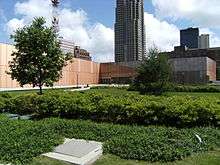Des Moines Public Library
 | |
| Established | 1866 |
|---|---|
| Location | Des Moines, Iowa, United States |
| Branches | Six |
| Website | http://dmpl.org |
The Des Moines Public Library (DMPL) is the public library system for the city of Des Moines, Iowa. It is the largest public library system in the state of Iowa, with a collection of 552,576 items housed at six locations.[1]
Services
The library provides research and reference services, as well as Internet computers and wireless Internet access, meeting and study rooms, copy machines and printers, and faxing.
Collection
The Des Moines Public Library[2] offers books, audio books, e-books, CDs, magazines, newspapers, information databases, and DVDs. Each location features adult, teen and children’s fiction and non-fiction collections. The library also has Special Collections[3] at the Central Library; an Iowa Collection that includes books and other items concerning the history and culture of Iowa; the Foundation Center; and The Shoah Visual History Collection.
Programs
The library presents a variety of informational, educational and fun programs for patrons of all ages. Programs for children and teens include storytimes, crafts, games, and book discussions. Adult programming includes book discussions, author visits, lectures, job assistance workshops, and other special events.[4][5] The library organizes several annual events, including the summer reading program and Authors Visiting in Des Moines (AViD) Author Series.
Authors Visiting in Des Moines (AViD)
Authors Visiting in Des Moines (AViD)[6] began in 2001 to give the community the chance to listen, learn and laugh as world-famous authors share their stories. With the support of the Des Moines Public Library Foundation and other local donors, including Humanities Iowa, AViD celebrates great reading and writing. Each year features best-selling fiction and nonfiction authors who write about a variety of issues and topics.[7][8]
Branches

| Branch | Address | Notes |
|---|---|---|
| Central Library | 1000 Grand Avenue | New location in 2006; Houses Special Collections; hosts Art Gallery; designed by noted architect David Chipperfield. |
| East Side Library | 2559 Hubbell Avenue | Renovated in Fall 2006; Features a large automotive collection |
| Forest Avenue Library | 1326 Forest Avenue | Renovated in 2007; Features large foreign language collection and accessibility to language learning software |
| Franklin Avenue Library | 5000 Franklin Avenue | Renovated in 2011; |
| North Side Library | 3516 Fifth Avenue | Renovated in 2007; Features a memorabilia room with a rich local history |
| South Side Library | 1111 Porter Avenue | Renovated in 2007; Features teen loft |
History
The Des Moines Public Library[11] began as the Des Moines Library Association in 1866 in the basement of a Methodist church. Early on, the library was supported by contributions and public charity. It started with nearly 2,300 books and a few periodicals. In 1882, it was decided to turn the library over to the city to become a free public library. The city purchased property at 100 Locust Street for the main library in 1898 for $35,000. The library opened in October 1903, and the Main Library branch remained at 100 Locust Street for more than 100 years. For more information about the original library building, see Public Library of Des Moines.
In 1938, the library became the birthplace of the Library Bill of Rights under director Forrest Spaulding.[12] The bill is still in use today by the American Library Association to ensure diversity of viewpoints in all library materials.
Through the years, the library became a cornerstone for the Des Moines community. In 1937, the Boys and Girls Department opened on the ground floor. During the 1930s, local artist Harry Donald Jones began painting a mural on the ground floor as a Works Progress Administration (WPA) project. The mural, called "The Social History of Des Moines," traced the growth of Des Moines from prehistoric times to present days. In the 1950s, the library developed a music department that featured a large collection of circulating vinyl records, a listening room with piano and record player, and a series of free concerts of recorded music presented weekly in the library's auditorium.
Beginning in the 1960s, the library began consolidating several of the small branches into larger regional branches. This began with the West Side Branch opening in 1965 (later renamed the Franklin Avenue branch). The new East Side Library opened in 1970, and the South Side Library was built in 1977. This was followed by the North Side Library in 1983 and the Forest Avenue Library in 1992. These regional branches helped increase the services available to patrons while remaining neighborhood-based at heart.
On April 8, 2006 a new Central Library opened at 1000 Grand Avenue.[13][14] The new building was designed by London architect David Chipperfield[15] to serve the library’s growing collection and the technology needs of 21st century users. The previous Central Library (located at 100 Locust) is now the home of The World Food Prize.[16]
Des Moines Public Library Foundation
The Library Foundation[17] of Des Moines was founded in 1998 to support the resources and services of the library through fundraising and advocacy. The Foundation supports programs that benefit the Des Moines community and promote the library’s resources. With help from donors, foundations and corporations, the Foundation helps support the Des Moines Public Library.[18]
References
- ↑ "Des Moines Public Library FY 2010-2011 Annual Report" (PDF).
- ↑ "Services and Policies".
- ↑ "Special Collections".
- ↑ "Soul Food Festival".
- ↑ "Film camp".
- ↑ "Past AViD Authors".
- ↑ "Des Moines Register". Retrieved 23 March 2012.
- ↑ "Iowa Center for the Book".
- ↑ "David Milling Architects".
- ↑ "American Libraries".
- ↑ "About Us - History".
- ↑ "First Library Bill of Rights".
- ↑ "State Library of Iowa - Photo tour".
- ↑ "State Library of Iowa - Tour".
- ↑ "David Chipperfield Architects".
- ↑ "The World Food Prize".
- ↑ "Des Moines Public Library Foundation".
- ↑ "Foundations for the Future".